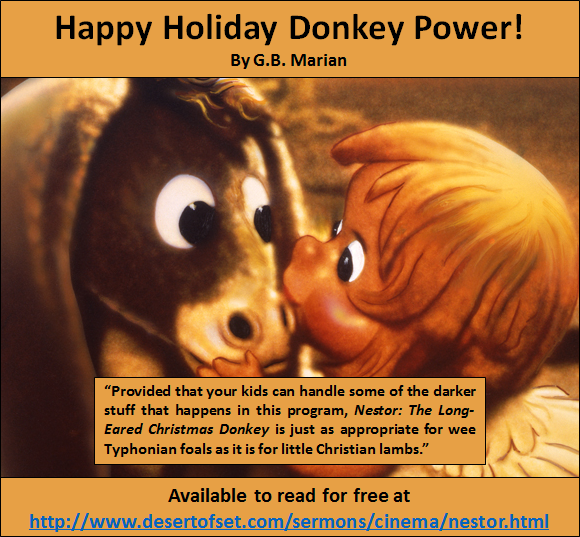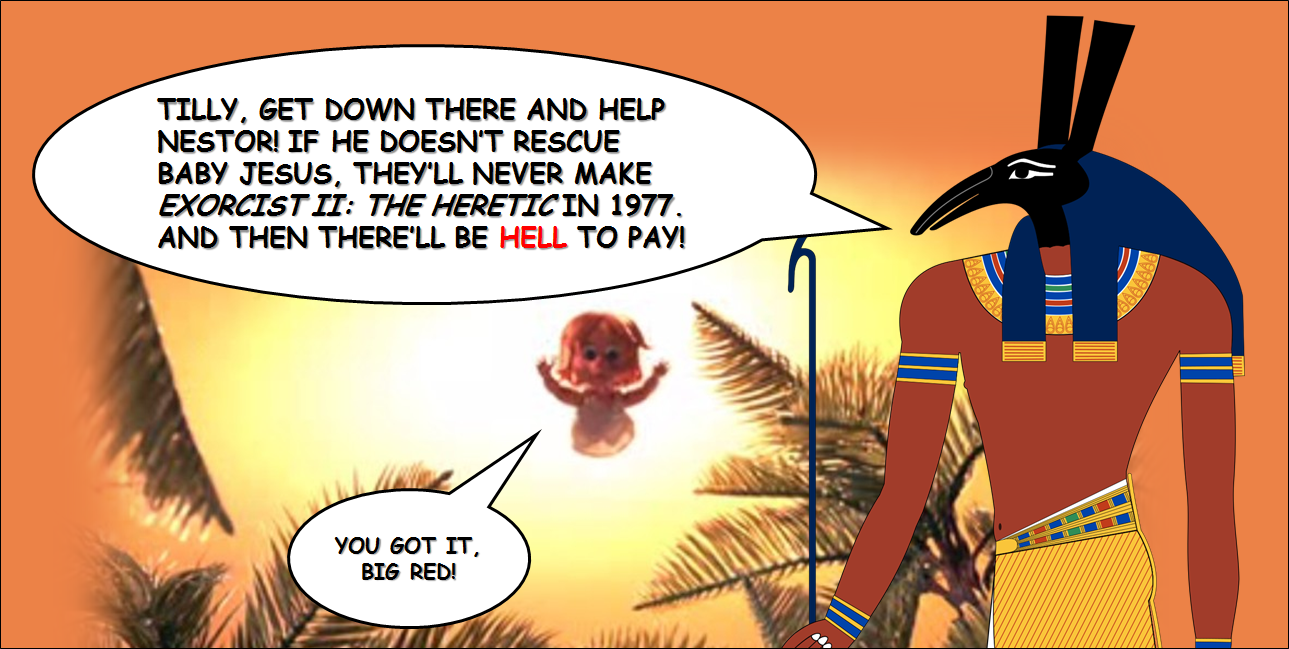

Nestor: The Long-Eared Christmas Donkey (1977) is definitely not the sort of thing I normally watch. It’s one of those stopmotion specials made by Rankin-Bass Productions (the creators of the Rudolph the Red-Nosed Reindeer puppetoon from 1964, starring Burl Ives). But for reasons explained below, Nestor is my personal favorite thing to watch at Yuletide. Nestor, you see, is more or less the equine equivalent to Rudolph. He was born with a pair of ridiculously long ears, over which he habitually trips and stumbles. He lives with his mother in a barn somewhere in Northern Europe, and all the other animals make fun of him for his ears. Hell, even the Roman Army rejects him when they storm the barn to commandeer every available donkey. This really pisses the owner off, inciting him to beat poor Nestor and throw him out into the cold. Thankfully, Nestor’s mother breaks free to find her son and protect him in all that snow; but when Nestor wakes up the next morning, he’s horrified to find his loving mother dead.
(Come to think of it, this is really much darker and more depressing than anything in the story of Rudolph. Ol’ Rudy had it pretty easy compared to poor Nestor!)

Anyway, Nestor walks around aimlessly after that, but is then found by a cherub named Tilly, who tells the donkey he must travel to a far-off land. When he reaches this destination, he is discovered by a man and his pregnant wife. They are in need of a good donkey for the woman to ride as they travel, and something about Nestor just makes them really like him. Then, the three of them get caught in an awful sandstorm out in a desert somewhere, and all seems lost. But Nestor hears his mother’s voice guiding him to safety, and he protects the woman on his back with his gigantic ears. Then Nestor leads his humans to a manger, where the woman—Mary—safely gives birth to her son, Jesus Christ. So it is that Nestor becomes a hero and is memorialized in every Nativity display that’s ever seen at Christmas (though, as the donkey who’s narrating this story helpfully explains, no one ever gets poor Nestor’s ears right).
The biblical inspiration for this story is obvious, and I can see how it would be perfect viewing for children in Christian families. But despite featuring Joseph and Mary on their way to the manger, this cartoon really isn’t that preachy; it assumes everyone watching it already knows who Jesus is, and it doesn’t waste any time explaining why the protagonist should help this particular family. This prevents the story from insulting its audience too much; and as someone who is familiar with tales of other savior deities having miraculous births, I think this aspect of Nestor actually leaves things open for interpretation a little. Our humble little hero might just as easily be attending to the birth of Mithras. This brings me to the main reason I enjoy this TV special; it can just as easily be read as having a powerful Setian message.
The most obvious thing is that Nestor himself is a member of Equus africanus asinus, which is sacred to Set. Then there’s the fact that even among his own species, Nestor is a social outcast. He is alienated by qualities that are later revealed to be extremely useful (as with Rudolph’s shiny red nose). Then he becomes a hero by making it possible for an unborn god to be born. The parallels to Great Set are obvious: He too is often a donkey (or a man with a donkey’s head); He too is also an outcast; He too learns to use His divergent qualities for heroic ends; and He too rescues an unborn deity (though Set does this every night, not just at Christmas!). Given the connections between Set, Yahweh, and Jesus that are suggested by the Greek magical papyri, the Alexamenos graffito, and the “barbarous name” ABERAMENTHO, it’s difficult for me not to view Nestor as an avatar whom Set uses to ensure a safe birth for Christ (perhaps as a kind of “favor” to the younger god). Even when Tilly says she has been sent to guide little Nestor at her god’s request, it is only implicitly hinted that her god is actually Yahweh; for all we know, Tilly could actually be from Sutekh’s Secret Place beyond the Great Bear, and not from the biblical heaven at all!

Provided that your kids can handle some of the darker stuff that happens in this program, Nestor: The Long-Eared Christmas Donkey is just as appropriate for wee Typhonian foals as it is for little Christian lambs. I highly recommend watching Nestor this holiday season, whether you are Setian, Christian, or just a person who loves donkeys. Here’s wishing everyone a happy holiday season!
